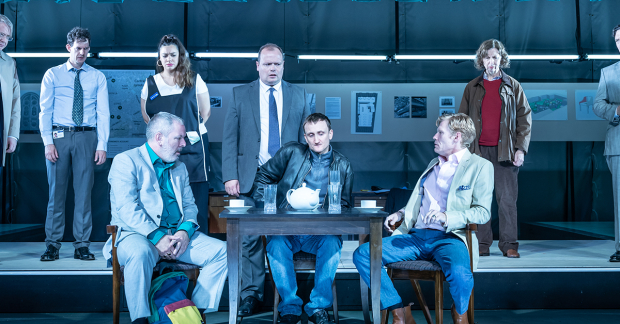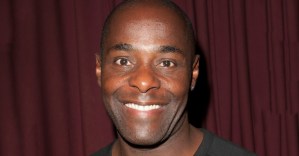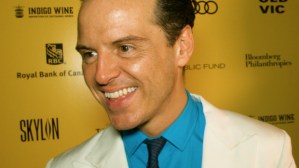Review: A Very Expensive Poison (Old Vic)
Lucy Prebble adapts Luke Harding’s account of the poisoning of Alexander Litvinenko

© Marc Brenner
It begins quietly with a kindly lawyer meeting a sad woman in a coffee shop, explaining to her that the British government have blocked an inquest into the death of her husband – one Alexander Litvinenko, a Russian detective who had been made a British citizen just three days before he turned up at a north London hospital, poisoned, as it turned out, with polonium-210.
That craven act of refusal to investigate the reasons for the murder of a man at the hands of his former colleagues in the Russian security services on the grounds that it would be "inconvenient" is the starting point for a different kind of public enquiry, a play of bravura brilliance by Lucy Prebble, based on Luke Harding's book about the case and the real public enquiry that ultimately concluded that Litvinenko's terrible death was part of an operation "probably approved by President Putin."
What Prebble does superbly is to make the raw facts of the murder spring to the kind of theatrical life that makes a troubling, tragic story into something more: an inquiry into the way that nations and people react to one another, showing both the best and the worst of human nature in the process.
With the inventive and confident help of director John Crowley and the entire production team, she does this in ways that are thrilling. The initial realism of the scene is quickly broken when Litvinenko's loving wife Marina (MyAnna Buring) steps out of the frame directly to address the audience; then Tom Brooke's Alexander climbs from his hospital bed to help the investigating detective (Gavin Spokes) uncover the truth of the affair.
By the end of the evening, every theatrical device has been explored: Tom Scutt's wonderful sets break apart to reveal the bare bones of the theatre walls, and then to recreate the police investigation; the President (a wonderful, sinister yet confiding Reece Shearsmith) has left his desk at the FSG and is haranguing the audience from an upstairs box, spreading his own view of the truth, and commenting on the price of programmes and the state of the Old Vic's loos. Giant puppets representing past Soviet leaders have settled down to watch TV, the oligarch Boris Bereszovsky (wonderful Peter Polycarpou) has broken into song, and cack-handed assassins have clambered through the stalls on their way to their deadly mission.
It's bonkers and always surprising, but what is deeply impressive about Prebble's writing is that it never loses its complexity and its sinewy combination of humour and emotion. She has form with the disruption of theatrical mores as her previous play Enron showed, but A Very Expensive Poison also reveals the utter mastery of plot and character that she has shown in her TV work on series such as Succession.
Just at the very close – when she uses the words of the public enquiry and the real voices of the actors – the tension loses its grip, but up to that point the play has made us care profoundly about the human tragedy at the heart of all the real politik. This is partly because Buring and Brooke are so touching and appealing; they delicately create a picture of a real marriage, under stress for all the usual as well as some very unusual reasons, and a love that made Marina go on fighting for justice long after her Sasha had died.
But it's also because Prebble is bold and brave enough to raise awkward questions. There's a chilling moment when one of the killers (Michael Shaeffer) fiercely asks what the effects of losing 25 million soldiers in a war might have had on the psyche of Russia and its menfolk. "Pride is something you seek when you've lost everything else." Nor does the British government escape unscathed in its refusal to investigate the Litvinenko case when it suited its pursuit of "soft power."
Political, engaged theatre of such scope is rare; theatre that presents its case with such flair, power, humour and emotional punch is rarer still. It's very wonderful.


















